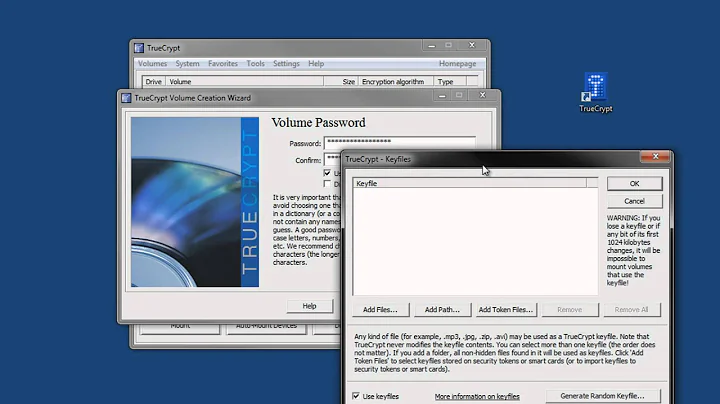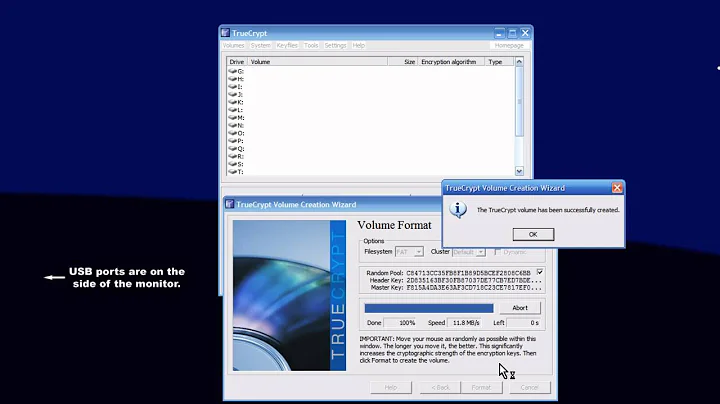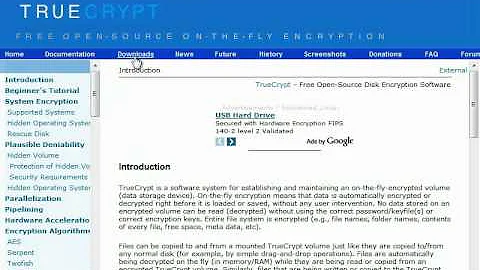How do I install Truecrypt?
Solution 1
If you prefer to install from a ppa you can use this one for Ubuntu 12.04:
sudo add-apt-repository ppa:michael-astrapi/ppa
sudo apt-get update && sudo apt-get install truecrypt
And to remove it:
sudo apt-get install ppa-purge
sudo ppa-purge ppa:michael-astrapi/ppa
In the past others have used different PPA: link here
Solution 2
I had similar issues on ubuntu 12.04 & installing truecrypt 7.1
however finally what worked was simply:
tar xzvf truecrypt*.gz
- this extracted the file truecrypt-7.1a-setup-x86 in the same directory.
Then I ran the command:
./truecrypt-7.1a-setup-x86
This will install everything perfectly.
sunil
Solution 3
I'll break it down, although I'm verbose, this is the simplest way.
Go to http://www.truecrypt.org/downloads
Scroll down to Linux and select the Standard version that matches your bit depth (32-bit or 64-bit) and download it.
After the download completes, Double click on the downloaded file and it should automatically open with the Archive Manager.
At the top of the Archive Manager, click Extract and select a destination folder, I picked Downloads
Press the Start button on your keyboard (The button between the left Ctrl & Alt) and type the word Terminal and press the enter key.
Here you will type commands inside terminal: You'll need to Change Directory (CD) to where you extracted the truecrypt setup file, if you followed my example, it would be this (note your path is case sensitive):
cd Downloads
To start the install, highlight and copy one of these commands and paste it into the Terminal window. (to paste, right click and select paste).
For 64 bit:
./truecrypt-7.1a-setup-x64
For 32 bit:
./truecrypt-7.1a-setup-x86
You then shuold get a xmessage window with an option at the bottom to Install TrueCrypt, click it.
The next window will be an xmesssage License message, click I accept and agree to be bound by the license terms
The next window will tell you how to uninstall it, if you don't plan on uninstalling it, you can skip this information.
The last window will be titled TrueCrypt Setup and have the information where it installed and will finish with Press Enter to exit... I recommend you press enter.
You're done.
Press the Start button again and type TrueCrypt, (capitalization unimportant) and press enter to open
Tip: If you want it on your unit bar, simply use your mouse to drag the TrueCrypt icon to your unity bar.
Note: if you have an unconventional keyboard layout with no 'Start' you could open Terminal from the 'Dash Home' in the side-bar.
Solution 4
The latest version of TrueCrypt works perfectly on Ubuntu 12.04 and all later versions of Ubuntu provided that you install all of its required dependencies. In Ubuntu 12.04 and later, open the terminal and type.
sudo apt-get install bzr libncurses5-dev gcc debhelper devscripts dpatch
Then install TrueCrypt the usual way with tar xzvf truecrypt*.gz followed by either ./truecrypt-7.1a-setup-x64 (for 64-bit OS) or ./truecrypt-7.1a-setup-x86 (for 32-bit OS).
Solution 5
Another PPA is available here.
sudo add-apt-repository ppa:stefansundin/truecrypt
sudo apt-get update
sudo apt-get install truecrypt
This version also includes an application indicator menu in the Ubuntu title bar.
At the time of this answer's last edit, the version available is 7.1a.
Related videos on Youtube
Duanek
Updated on September 18, 2022Comments
-
Duanek over 1 year
I have a Windows 7 machine with
Truecrypt. I installed Ubuntu 12.04 with the intention of converting to an Ubuntu only machine but I can't installTruecrypton Ubuntu.I have been looking through the forums and have followed all advice to the letter and still
Truecryptdoesn't work; I have only a non-functional icon in "dash". Should I uninstall Ubuntu and start over (ie reinstall)? I love Ubuntu and greatly appreciate your efforts on this forum. -
Terry almost 10 yearsThank you. I had run into problems with the other solutions (using a repository and apt-get), but this is the one solution that worked. Thank you.
-
Karel Bílek almost 8 yearsNo longer working for me :(


![Encrypt Your USB Flash Drive Files With TrueCrypt [Tutorial]](https://i.ytimg.com/vi/tQsCQEx7NnQ/hq720.jpg?sqp=-oaymwEcCNAFEJQDSFXyq4qpAw4IARUAAIhCGAFwAcABBg==&rs=AOn4CLAnULKKOnd4J95q-OMvHnDxu-s7yA)


